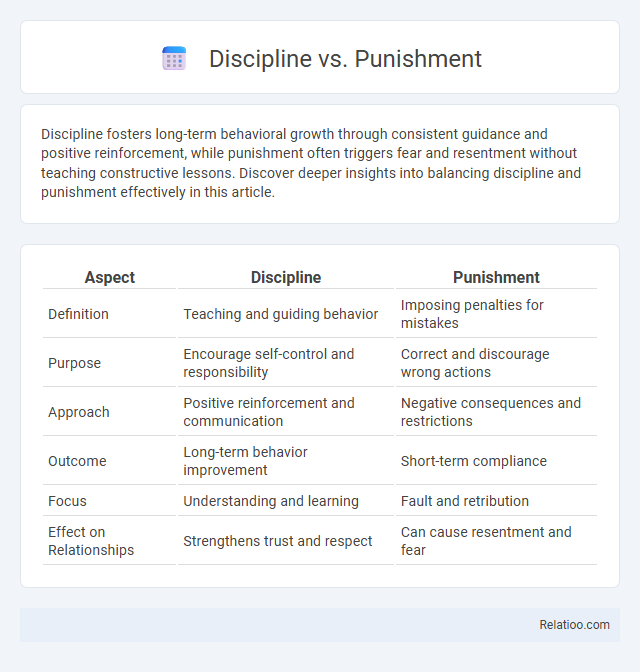Discipline fosters long-term behavioral growth through consistent guidance and positive reinforcement, while punishment often triggers fear and resentment without teaching constructive lessons. Discover deeper insights into balancing discipline and punishment effectively in this article.
Table of Comparison
| Aspect | Discipline | Punishment |
|---|---|---|
| Definition | Teaching and guiding behavior | Imposing penalties for mistakes |
| Purpose | Encourage self-control and responsibility | Correct and discourage wrong actions |
| Approach | Positive reinforcement and communication | Negative consequences and restrictions |
| Outcome | Long-term behavior improvement | Short-term compliance |
| Focus | Understanding and learning | Fault and retribution |
| Effect on Relationships | Strengthens trust and respect | Can cause resentment and fear |
Understanding Discipline vs Punishment
Understanding discipline versus punishment involves recognizing that discipline aims to teach and guide behavior through positive reinforcement and consistent boundaries, fostering self-control and responsibility. Punishment, on the other hand, focuses on imposing penalties or consequences to deter undesirable actions, often relying on fear or pain. Effective discipline promotes long-term behavioral change and emotional growth, while punishment may result in short-term compliance but can harm relationships and hinder personal development.
Core Principles of Discipline
Discipline is rooted in teaching and guiding behavior through consistent expectations and positive reinforcement, emphasizing respect, self-control, and responsibility. Unlike punishment, which focuses on penalizing mistakes, discipline develops long-term behavioral improvements by encouraging your understanding of consequences and fostering internal motivation. Core principles of discipline include clarity, consistency, and empathy, ensuring that boundaries help individuals grow rather than merely comply.
What Defines Punishment?
Punishment is defined by its intent to impose a penalty or consequence after a wrongdoing, often emphasizing control, deterrence, and correction through negative stimuli. It typically involves a response that is imposed on an individual to diminish undesirable behavior, prioritizing obedience over understanding. Unlike discipline, which fosters internal self-regulation and learning, punishment relies on external enforcement and may not promote long-term behavioral change.
Psychological Effects of Discipline
Discipline fosters self-regulation and intrinsic motivation by promoting consistent behavioral expectations and positive reinforcement, which supports emotional resilience and cognitive development. Unlike punishment, which often induces fear, anxiety, and resentment, effective discipline nurtures a sense of security and self-worth, leading to improved mental health outcomes. Psychological research highlights that discipline anchored in empathy and clear communication enhances children's social skills and long-term behavioral adjustment.
Psychological Effects of Punishment
Punishment often leads to negative psychological effects such as increased anxiety, fear, and resentment, which can undermine your child's emotional well-being and hinder long-term behavioral improvement. Discipline, on the other hand, fosters self-control, understanding, and internal motivation by using consistent, positive strategies that promote healthy brain development and emotional regulation. Differentiating between punishment and discipline is crucial to cultivating a supportive environment that encourages growth and resilience.
Discipline: Fostering Positive Behavior
Discipline focuses on guiding and teaching children to develop self-control, responsibility, and positive behavior through consistent and supportive methods. It emphasizes understanding and addressing the root causes of behavior rather than simply imposing penalties or punishment. By fostering your child's growth with discipline, you create a foundation for long-term emotional and social development.
Punishment: Risks and Long-Term Impact
Punishment often leads to short-term compliance but poses significant risks including increased aggression, anxiety, and damaged trust in relationships. Research shows that relying on punishment can hinder Your child's emotional development and impulse control, potentially causing long-term behavioral issues. Positive discipline promotes learning and self-regulation, reducing the negative impact that punishment may cause over time.
Discipline Strategies That Work
Effective discipline strategies emphasize positive reinforcement, clear communication, and consistency to encourage desired behaviors. Techniques such as setting realistic expectations, using natural consequences, and providing choices increase compliance and promote self-regulation. Evidence-based approaches like the authoritative parenting style and social-emotional learning programs demonstrate significant improvements in children's behavior and long-term development.
Alternatives to Punitive Measures
Alternatives to punitive measures emphasize positive reinforcement, restorative practices, and constructive feedback to foster self-discipline and accountability in individuals. Methods such as setting clear expectations, offering choices, and promoting problem-solving skills encourage intrinsic motivation and long-term behavioral change. Emphasizing empathy and communication helps build trust and respect, reducing the reliance on punishment and supporting a healthier learning or developmental environment.
Building a Culture of Discipline, Not Fear
Building a culture of discipline involves fostering self-control, responsibility, and intrinsic motivation rather than relying on punishment, which often generates fear and compliance without understanding. Emphasizing positive reinforcement and clear expectations encourages sustainable behavior change and strengthens organizational cohesion. Effective discipline cultivates an environment where individuals are empowered to make ethical decisions, enhancing long-term performance and trust.

Infographic: Discipline vs Punishment
 relatioo.com
relatioo.com